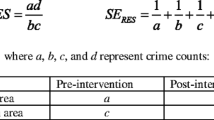Abstract
The police are perceived by overseas agencies to play a key role in thedevelopment of democratic states. In the Russian Federation, the promotion of trust between the police and the public has been hampered by the fact that police are perceived by the public, and reported by the media, to be open to using their positions at work to obtain money, goods or services. Survey research about beliefs and values concerning corruption was conductedamongst students and serving officers attending a police institute, whichprovides the most promising Russian police recruits with a four-year higher education leading to the rank of ``officer''. From these ranks will come those police who are likely in future to shape both policy and institutional values. The data provided evidence that ``fast-streamed'' police recruits think that corruption is often justifiable and/or morally acceptable underparticular circumstances, or for particular goals.
Similar content being viewed by others
References
Austin, J.L., “A Plea for Excuses,” in J.D. Urmson and G. Warnock (eds.), Philosophical Papers (Oxford: Clarendon Press, 1961).
Bayley, D., Democratising the Police Abroad: What To Do And How To Do It, Issues in International Crime, (Washington: National Institute of Justice, Office of Justice Programs, 2001).
Clark, W., Crime and Punishment in Soviet Officialdom (New York: M.E. Sharpe, 1993).
Favarel-Garrigues, G., “Privatization at Any Cost. Struggle against Economic Crime in Yekaterinburg,” in V. Coulloudon (ed.), The Power of Corruption in Russia (Boulder, Colorado: Westview Press, 2002) forthcoming.
Fituni, L., “Economic Crime in the Transition to a Market Economy” in A. Ledeneva and M. Kurkchiyan (eds.), Economic Crime in Russia (London: Kluwer, 2000) pp. 17–30.
Galeotti, M., “Who's the Boss: Us or the Law? The Corrupt Art of Governing Russia” in S. Lovell et al. (eds.), Bribery and Blat in Russia (Basingstoke: Macmillan, 2001) pp. 270–287.
Halpern, D.H., “Moral Values, Social Trust and Inequality; Can Values Explain Crime?” British Journal of Criminology 2001 (41:2), 236–251.
Heidenheimer, A.J. (ed.), Political Corruption: Readings in Comparative Analysis (New York: Holt, Rinehart and Winston, 1970).
Huntingdon, S.P., cited in Clark, W., Crime and Punishment in Soviet Officialdom (New York: M.E. Sharpe, 1993) p. 9.
Klitgaard, R., Controlling Corruption (Berkeley: University of California Press, 1987).
Klockars, C. et al., The Measurement of Police Integrity (Washington: NIJ, 2000).
Kurkchiyan, M., “The Transformation of the Second Economy into the Informal Economy,” in A. Ledeneva and M. Kurkchiyan (eds.), Economic Crime in Russia (London: Kluwer, 2001) pp. 83–97.
Ledeneva, A., Russia's Economy of Favours (Cambridge: Cambridge University Press, 1998).
Miller, W., A. Grødeland and T. Koshechkina, A Culture of Corruption? (Budapest: CEU Press, 2001).
Rose-Ackerman, S., Corruption and Government (New York: CUP, 1999).
Shelley, L., “Post-Socialist Policing: Limitations on Institutional Change,” in R. Mawby (ed.), Policing Across the World (London: UCL Press, 1999) pp. 75–87.
Shevchenko, O., “Bread and Circuses: Shifting Frames and Changing References in Ordinary Muscovites' political talk,” Communist and post-Communist Studies 2001 (34), 77–90.
Van Duyne, P., “Combating Corruption: Acts and Attitudes,” in M. Joutsen (ed.), Five Issues in Criminal Justice (Helsinki: HEUNI, 1999) pp. 22–60.
Volkov, V., “Patrimonialism versus Rational Bureaucracy: On the Historical Realities of Corruption,” in S. Lovell et al. (eds.), Bribery and Blat in Russia (Basingstoke: Macmillan, 2000) pp. 35–47.
Werner, S.B., “New Directions in the Study of Corruption,” Public Administration Review 1983 (43:2), 146–154.
Zinoviev, A., cited in A. Ledeneva, Russia's Economy of Favours (Cambridge: Cambridge University Press, 1998) pp. 44–45.
Author information
Authors and Affiliations
Rights and permissions
About this article
Cite this article
Beck, A., Lee, R. Attitudes to corruption amongst Russian police officers and trainees. Crime, Law and Social Change 38, 357–372 (2002). https://doi.org/10.1023/A:1021140413153
Issue Date:
DOI: https://doi.org/10.1023/A:1021140413153




